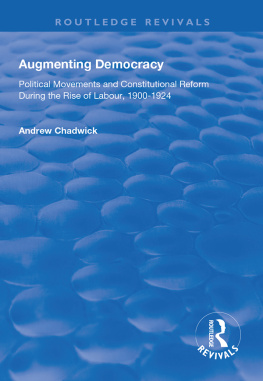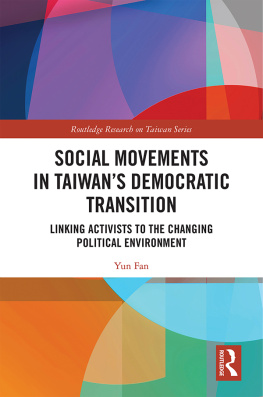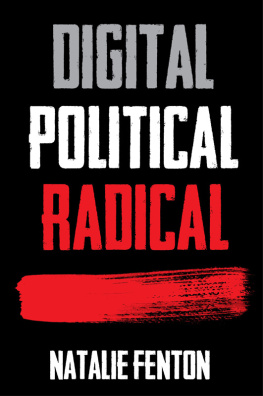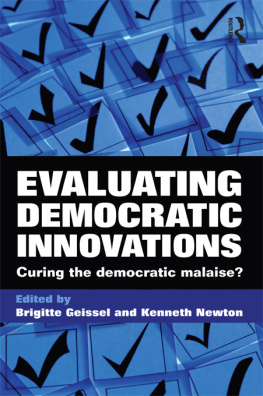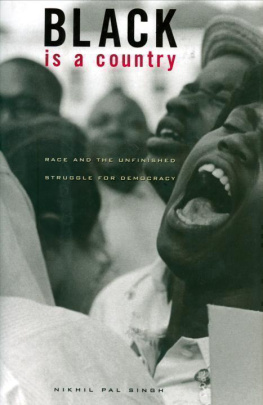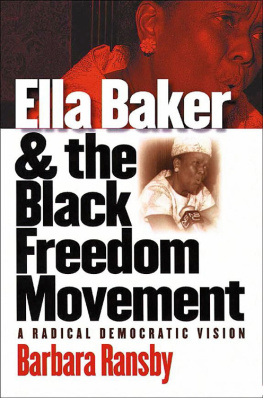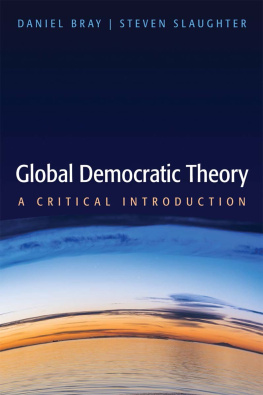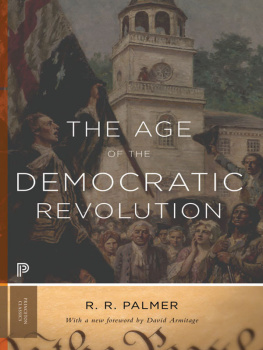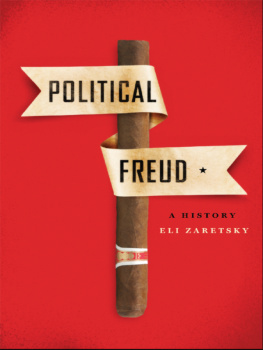DEMANDING DEMOCRACY
MARC STEARS
Demanding Democracy
American Radicals in Search of a New Politics
PRINCETON UNIVERSITY PRESS
Princeton and Oxford
Copyright 2010 by Princeton University Press
Published by Princeton University Press, 41 William Street, Princeton, New Jersey 08540
In the United Kingdom: Princeton University Press, 6 Oxford Street, Woodstock, Oxfordshire
OX20 1TW
All Rights Reserved
Library of Congress Cataloging-in-Publication Data
Stears, Marc.
Demanding democracy: American radicals in search of a new politics/ Marc Stears.
p. cm.
Includes bibliographical references and index.
ISBN 978-0-691-13340-9 (hardcover : alk. paper) 1. DemocracyUnited States. 2. RadicalismUnited States. 3. Political movementsUnited States. 4. Political activistsUnited States. 5. United StatesSocial conditions. 6. United StatesPolitics and government. I. Title.
JK1726.S74 2010
320.530973dc22
2009030292
British Library Cataloging-in-Publication Data is available
This book has been composed in Minion
Printed on acid-free paper.
press.princeton.edu
Printed in the United States of America
10 9 8 7 6 5 4 3 2 1
The prairie-grass dividingits special odor breathing,
I demand of it the spiritual corresponding,
Demand the most copious and close companionship of men,
Demand the blades to rise of words, acts, beings,
Those of the open atmosphere, coarse, sunlit, fresh, nutritious, Those that go their own gait, erect, stepping with freedom and command
leading, not following,
Those with a never-quelld audacity
those with sweet and lusty flesh, clear of taint,
Those that look carelessly in the faces of Presidents and Governors, as to say,
Who are you?
Those of earth-born passion, simple, never-constraind, never obedient,
Those of inland America.
Walt Whitman
CONTENTS
ACKNOWLEDGMENTS
This book originated in conversations at the University of Cambridge in the first two years of the twenty-first century. It was then that my colleagues, including Duncan Bell, Jude Browne, Geoffrey Hawthorn, David Runciman, Quentin Skinner, and Helen Thompson, first alerted me to a series of serious absences in contemporary deliberative democratic theory. Such theory, each of them insisted in their own very different ways, had no room for politics as it actually is: no place for the strategies and engagements that politicians and campaigners have to deploy as they struggle to make a difference in the world in which they live. It was a powerful lesson, and although I had, and still have, disagreements with a number of their arguments, the challenge that they posed got this project started, and for that I am extraordinarily grateful.
Since then I have retuned to Oxford, and Demanding Democracy has developed and expanded, helped again by a large number of friends and colleagues. Ian Malcolm of Princeton University Press was the ideal editor at every stage, exhibiting patience, support, and intellectual understanding in exactly the right ways. It was a pleasure to work with him and an inspiration as well. Tony Badger, Terence Ball, and Julia Stapleton generously supported the original proposal, assisting me in my application for a Leverhulme Trust Research Fellowship. The resulting award from the Trust, along with help from the Department of Politics and International Relations at Oxford, made the research for the book possible. Byron Shafer also provided funds for an extremely helpful visit to the archives in Madison, Wisconsin, and, even more importantly, was his usual generous self whilst I was there. I have also learnt an enormous amount from co-authoring with Desmond King and Mathew Humphrey; running workshops with Martin Best, Paul Jamieson, Melissa Lane, and Jon Stokes; organizing seminars and conferences with Michael Freeden and Ben Jackson; talking politics with Karma Nabulsi, who has shared her unrivalled expertise on virtuous action for political change; and discussing democracy with Bonnie Honig, who helped me come up with the title and, most importantly of all, persuaded me that there still remains so much more to say.
In addition to these acts of kindness, many friends and colleagues have helped directly with the text. Terence Ball, Eldon Eisenach, Sudhir Hazareesingh, Mark Hulliung, Mathew Humphrey, Desmond King, and Adam Sandell all read the first draft in its entirety; Desmond and Adam even read bits of it twice! The trenchant criticisms and thoughtful recommendations I received from them all have immeasurably improved the final version. Many others also provided insights on individual chapters and on the books central ideas. I am delighted to acknowledge the help of Andrew Abbott, Nancy Bermeo, Nigel Bowles, Peter Breiner, Jayant Chavda, Michael Freeden, Gary Gerstle, Eileen Gillooly, Michael Guppy, Cori Hayden, Liz Irwin, Ben Jackson, Annie Kingston, David Leopold, Robert Lieberman, Jane Mansbridge, Robert Mason, David Miller, Avia Pasternak, Dan Polin, Fiona Ross, Andrew Sabl, Quentin Skinner, Adam Swift, John A. Thompson, Mark Wickham-Jones, Stuart White, and Hughie Wong. They have all helped far more than they know.
In addition to these rich and rewarding conversations, perhaps the greatest pleasure of writing and research is the possibility it brings to work in some of the worlds greatest libraries. I have had immense satisfaction in seeking knowledge in the British Library of Political and Economic Science, the Butler Library of Columbia University, the National Library of Scotland, the State Historical Society of Wisconsin, the Tamiment Institute at New York University, the Library of the University of Western Australia, and, almost as good as any library, the Brattle Bookstore in Boston, where I discovered texts that would otherwise have remained completely unknown to me.
Most of all, though, I thank Lizzy Pellicano. Lizzy is a democrat in exactly Walt Whitmans sense. She combines a restless, impatient, and independent spiritnever constrainedwith generosity, empathy, and a passion for justice: truly close companionship. Living and working with her has enabled me to see the world anew.
INTRODUCTION
The United States is abuzz with talk of a new democracy. For the first time for many decades, political campaigners have captured the nations imagination by ardently condemning its prevailing order. They have denounced professional politicians for their hypocrisy, excessive partisanship, and cut-throat adversarialism; they have derided special interest groups for their corrupting influences; and they have demanded that citizens be provided more direct access to key decision-making processes. The same campaigners have also devised a host of new institutional arrangements to assist in this transformation. They have designed consultative committees and citizens juries to encourage citizen participation in policymaking; they have devised websites to facilitate dynamic political conversation across cyberspace; and they have sought to restore municipal squares and urban parks to the safe havens for public political discussion that they once were said to be.
It is no surprise, therefore, that these thinkers see great opportunities in the current trend toward reform, emphasizing in particular the possibilities that it provides for rejecting the excessive partisanship of the politics of the 1980s and 1990s and of engendering a deeper and wider commitment to deliberative civic virtue amongst the American public as a whole.
The ideals and practices of deliberative democracy have not been welcomed by everyone, however. In recent years a second group of equally well-regarded, if rather more intellectually disparate political theoristsincluding William Connolly, John Dunn, William Galston, Raymond Geuss, Chantal Mouffe, David Runciman, Ian Shapiro, Michael Walzer, and Sheldon Wolinhas rejected both the philosophical principles and the political proposals that underpin this search for a new kind of politics.




